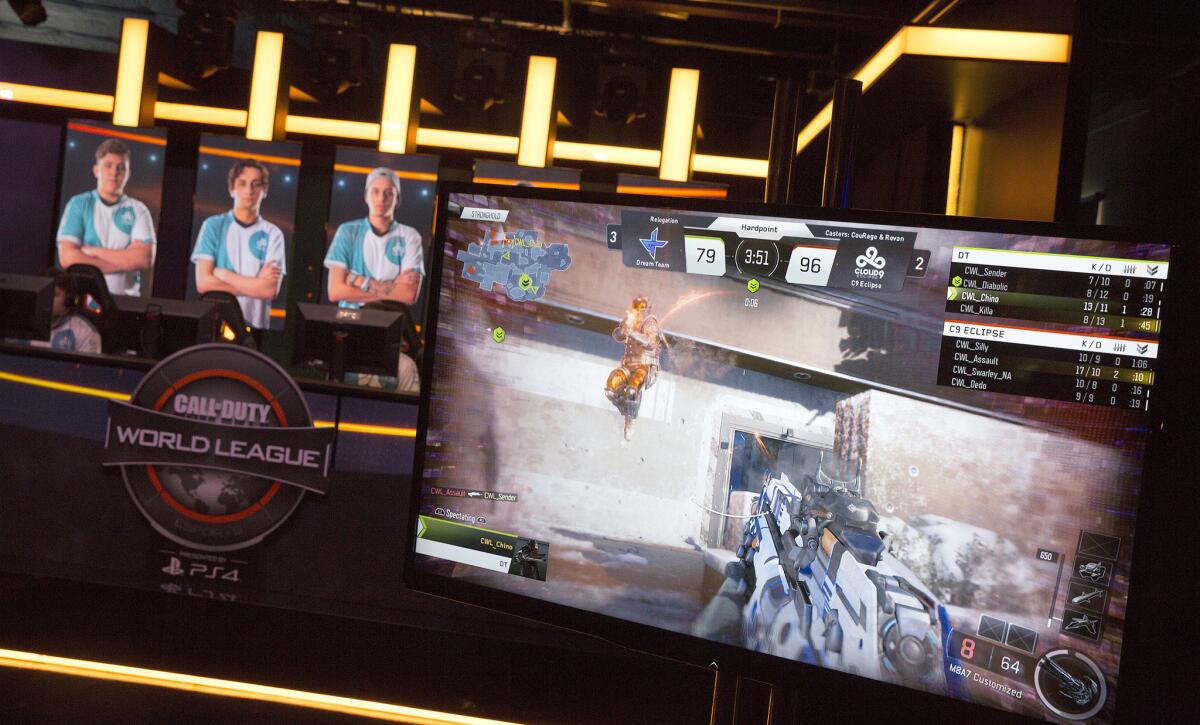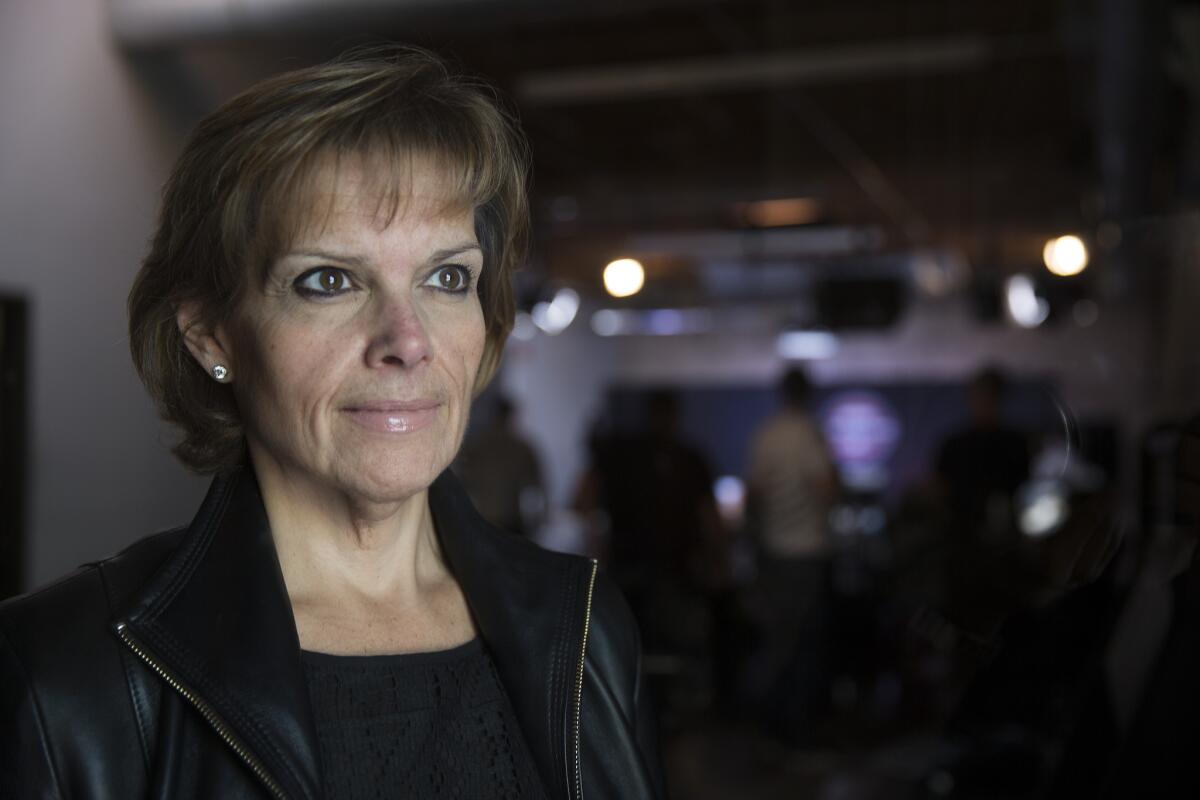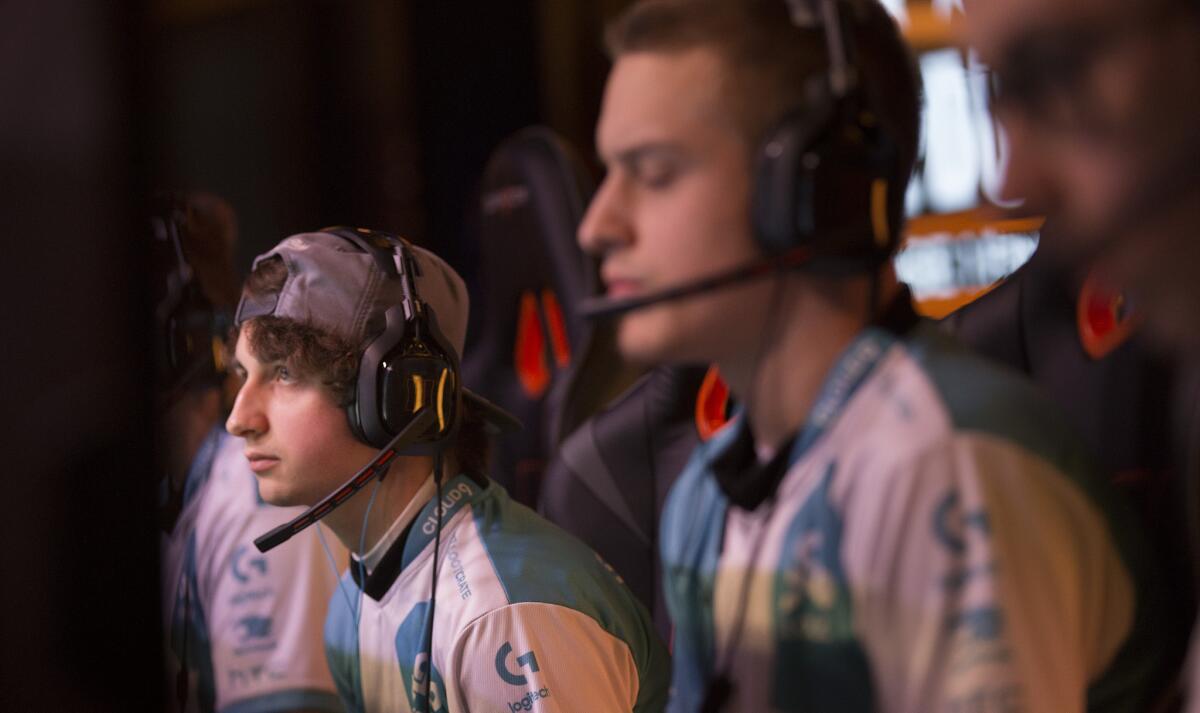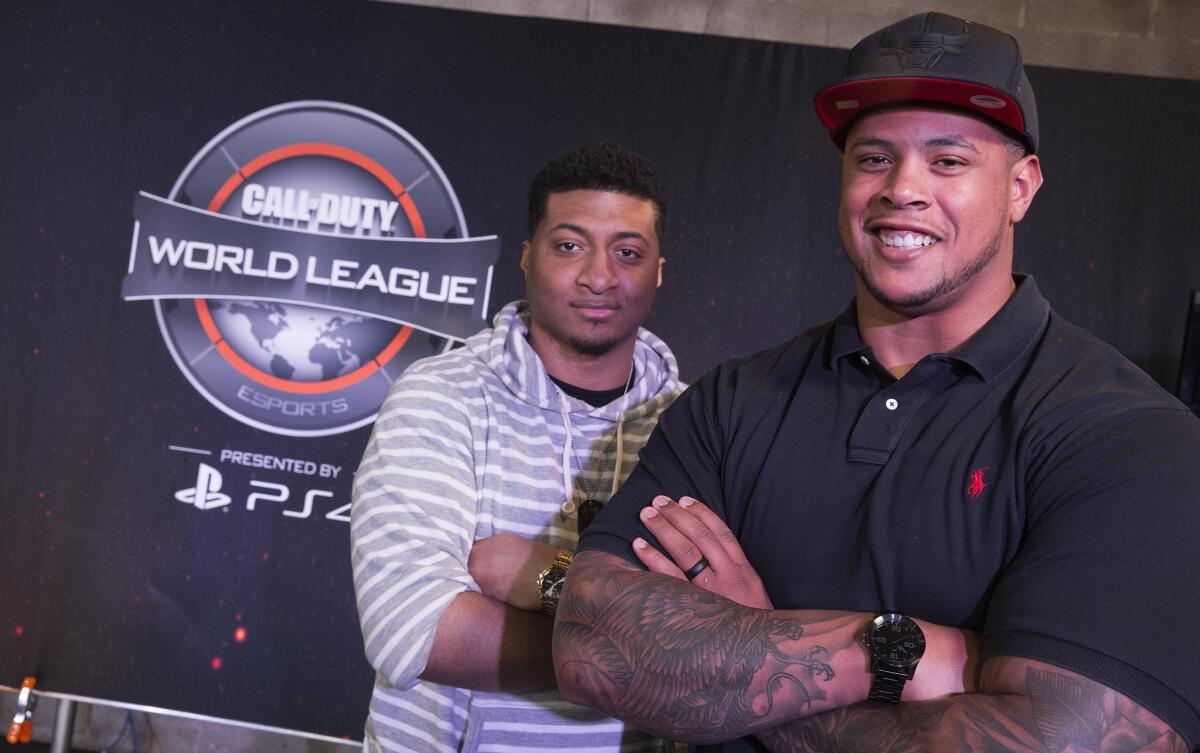Owners of professional video game teams in a battle of their own

Months after Susan Tully and friends bought a pair of professional video game teams for an estimated $1 million, her four-man “Call of Duty” squad finished its season in 11th out of 12 places.
A loss in a post-season gunfight would relegate Tully’s H2K squad to the second-tier league. There, exposure and sponsor interest would dissolve.
The distress Tully felt as she spent an April afternoon in a small, dark Burbank video studio watching her team attempt to avoid demotion was not the emotion she banked on when she put her money into the burgeoning industry. But upheaval is becoming something of a routine for the investors fueling pro video gaming’s rapid rise.
China’s richest man, Russia’s richest man, the U.S.’s fourth-richest man and a string of American multimillionaires all have ties to teams now. So do former Lakers and a current Rams lineman. Companies involved in e-sports include Alibaba, Coca-Cola, TBS and PokerStars.
These e-sports ventures, including an estimated 200 franchises, are expected to haul in nearly $900 million this year from sales of items such as match tickets, jerseys and online video ads, according to industry analyst SuperData Research.
But Tully and the other owners are in for a fight. Thousands of players, at least 10 top game publishers and half a dozen event organizers all want a piece of the business.
It’s as if nearly every franchise owner is trying to simultaneously manage a Major League Baseball team, an Arena Football League team and a Spanish premier league soccer team. And in each league, they’re embroiled in distinct disputes over how to generate and share revenue, negotiate salary caps and obtain immigration visas.
"Undoubtedly, there is more strife and chaos," said Bryce Blum, an e-sports-focused attorney. "As the e-sports pie grows, the level of conflict … will grow along with it."
It’s hard enough to find alignment among owners. Factions have emerged between gaming industry stalwarts and new-money investors like Tully who come from sports, media and finance.
“People from different industries – they are going to eat every untalented individual around,” said Carlos Rodriguez Santiago, owner of the Spanish franchise G2 ESports. “People who grew this industry but are not necessarily too talented will see themselves out of it.”
But corporate experience doesn’t necessarily prepare newcomers for an industry in which nothing is predictable. For instance, Tully, a former Universal Music Group vice president, was caught by surprise by the effort needed to get a South Korean player a work permit to compete in Germany.
“It’s moving at herculean speed,” said Tully, who spent thousands of dollars to land the permit. “When you go into these things, you don’t think about treaties and who’s able to move into a country like Germany.”

Many new owners, including Tully, aren’t gamers. But the amount of time their children spend with video games triggered interest.
She partnered with a lawyer, a hedge fund manager, a business professor and an entrepreneur to buy a majority stake in British firm H2K Gaming Ltd., which also controls one of the 10 highest-level European "League of Legends" teams.
TABLE: A look at the owners of top e-sports franchises »
Former NBA star Rick Fox was drawn in by a son, who aspired to be a professional player and connected with Los Angeles developer Riot Games. The company invited the elder Fox to watch “League of Legends" playoffs last year at Madison Square Garden. Nearby were NBA Commissioner Adam Silver, ESPN President John Skipper and other sports moguls.
“It grabbed me,” Fox said of the spectacle. “Hook, line and sinker.”
In December, he bought a “League of Legends” team with a business partner and several undisclosed minority shareholders. Their Echo Fox franchise has added teams that compete in five other games and signed a deal for a TV series.
Andy Miller, a passive Sacramento Kings co-owner and a minor league baseball team owner, didn’t just have his kids to thank for inspiring him to buy a “League of Legends” team in December. He also had witnessed the explosion of mobile games as an executive at Apple Inc.
Miller and 24 Hour Fitness founder Mark Mastrov brought in as NRG co-owners baseball star Alex Rodriguez to tutor players on dealing with competitive pressures and former NBA star Shaquille O’Neal to help build the franchise’s global appeal.
They’re among a cadre of owners betting that teams are most valuable as media companies, with players producing entertaining, sponsor-supported videos about their lives.
“You want to put a playoff team on the stage and the court,” Miller said. “The business is creating stars.”

Owners are seeking more power across the board, saying they bear too much risk in the nascent industry compared with the amount of say they get in decisions.
Some are minor. More involvement in match scheduling would give owners greater assurance about business plans and players’ health.
Other issues are hugely consequential. Franchises have been upended overnight by changes that owners say occurred with little oversight.
In April, leading tournament organizer ESL banned 2-year-old TeamYP because increasingly coveted advertisers didn’t want to associate with the franchise's owner: pornography website YouPorn.
ESL’s decision was “unfortunate,” but the team knew it would have “to be agile,” YouPorn Vice President Brad Burns said.
Last month, Riot Games ordered the sale of two big “League of Legends” teams and one minor league squad because owners violated rules designed to protect player welfare and competitive integrity.
Though owners called the rulings baseless, Riot e-sports director Whalen Rozelle said the company's 13 regional professional leagues worldwide provide “a vital foundation” on which teams can “confidently invest with expectations of stability.”
The harsh penalties could deter nefarious owners from entering e-sports. As Fox, the former Laker, put it: “I love that Riot is conducting themselves in the fashion that a league should be run." But he also compared developing a franchise at this moment with erecting a building on a plot whose terrain changes every day.
Alexander Kokhanovsky perceives the instability when he compares the multimillion-dollar prizes championship teams win today with the case of beer he’d get a decade ago for dominating a “Counter-Strike” challenge.
“With the extra money, it’s very uncontrollable,” said Kokhanovsky, who manages seven teams from his 500-square-foot office in Kiev.
The glitzy names entering e-sports have increased demands from players for larger upfront salaries and additional pay protection upon retirement or release.
Some owners have suffered acrimonious public feuds with players. Timothy Heggem, an Orange County attorney at Payne & Fears who represents e-sports teams, suggested that regulatory uncertainty contributes to disputes.
“There’s those [owners] who think players are fungible and can be treated like cattle, and those who are more careful,” he said. “There’s those playing a little fast and loose with their players and reputations, and others that are in it for the long haul.”
Franchises want to keep salaries in check because many players exclusively keep income from prizes, personal endorsement deals and ads on their Twitch streams.
They also claim insufficient support from tournament organizers. For instance, Riot Games provides teams that compete in its “League of Legends” tournaments with cash. It's meant to pay a minimum salary for players, but teams are concerned that the subsidies aren’t growing fast enough.
Furthering frustration is that new, well-financed teams such as “League of Legends” group Immortals, whose investors include Los Angeles venture capitalists and media executives, are amassing star-studded teams after awarding salaries in the hundreds of thousands of dollars.
Racking up wins has justified the strategy, while increasing calls for caps on salaries to maintain competition.
“Championships can’t just be controlled by the wealthy,” Tully said.
Immortals Chief Executive Noah Whinston said pay limits and other regulations would stifle e-sports’ growth and that “current salaries will look like peanuts” in less than two years.
Franchises stocked with cash also are supporting players with myriad specialists. Coming on board are statistical analysts, psychologists, nutritionists, scouts, trainers, social media specialists, bloggers, graphic designers, business development experts and video teams.
Keeping up isn’t cheap. In 2011, Kokhanovsky used his own money, a friend’s and a bank loan to launch Natus Vincere. He’s had to plug in more. The franchise lost almost $200,000 in 2014 and earned only a small profit in 2015, with 80% of revenue coming from advertisers.

Some young owners, such as Rams offensive lineman Rodger Saffold, are exercising restraint. Saffold said he wants his “Call of Duty” team to go after the sport “hard” to become “one of the upper echelon” franchises. He started Rise Nation in 2014 with friend and former e-sports athlete Kahreem Horsley after signing a five-year, $31.7-million deal with the Rams.
But rather than spend aggressively, Saffold is concentrating on building chemistry among the existing squad by leaning on his own lessons from the locker room.
“Being an athlete is an x-factor,” he said. “You can see who gels well together. You can’t just take top players and say ‘go play.’”
If video games are about fun, Tully was having none of it at Activision Publishing’s “Call of Duty” World League set in Burbank.
After dropping the first three games in a best-of-seven series, her team teetered one loss away from being swept into irrelevance.
English soccer and other leagues have long booted under-performing teams to a lower division. Tully’s concern is that the revenue gap between e-sports tiers is wider – and can destroy the basis for large investments in a big-league team, she warned.
More than money is on the line. Owners’ success or failure could affect a generation of youth surrendering their formative years for the chance of making it big in e-sports.
League organizers recognize that relegation puts “pressure on owners,” but it’s “super awesome” for fans, Riot Games co-founder Brandon Beck said on stage at a recent industry event. “There’s a lot to wrangle.”
Fortunately for Tully, her players electrified. They won the fourth game.
“Holy cow; here we go,” Tully said.
H2K stunned with three more victories to take the match and stay in the upper division.
“For the players, this is the path they’ve chosen for their lives,” Tully said afterward. “But the most difficult thing was watching them knowing so much was riding for their young professional lives.”
Twitter: @peard33




